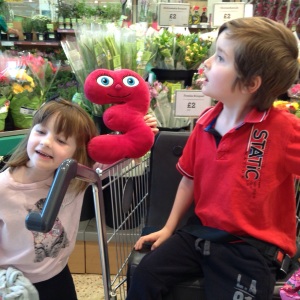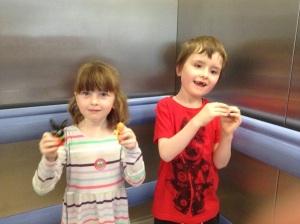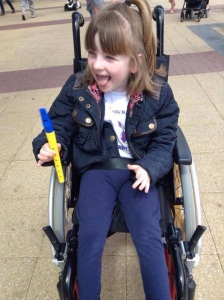We were sitting waiting in the car; unassuming, ordinary, an almost everyday occurrence. But the conversation was anything but. I have replayed it in my head a few times now because the insight, compassion and sheer innocence of it all was something very special.
Children see the world so differently. And there is so much we can learn from a six-year-old.
“Mummy, we are parked in a wheelchair space” she piped up, so matter of factly.
“I know honey, it is ok. Isaac is with us (her twin brother who has a number of disabilities) and I have put the blue badge up.”
“But you have not got his wheelchair?”
“That is ok too sweetie as not everyone who is disabled uses a wheelchair. Isaac is disabled but he does not use his wheelchair sometimes. The picture is just used to tell other people the space is for disabled people.”
“Well that is a bit silly! I don’t like that sign mummy because it is not right. Why have it for cars? They are not disabled. And it is not right on the toilets too! Wheelchairs don’t use toilets, people do!”
“I know. But they use it as a sign to mean disabled because wheelchairs are something lots of disabled people use. And on the toilets it is just like the sign for woman and men and changing babies too”
“Well the baby change one is wrong too! My brother is not a baby and you take him into the baby change too sometimes. Do shops not think that sometimes big children still need changed and they are not babies? That makes me sad because my brother is not a baby.”
“I agree. Sometimes it makes me sad too darling. But it is just a sign and nobody means it to upset people.”
There was a pause while I sorted out her brother who was upset and in doing so I knocked over his parking badge. My daughter noticed and continued…
“Well, if I was disabled I would not want a blue badge…”
Another pause while I wonder how I should reply to this but before I can she continues…
“I would want a pink one! Girls should have pink ones!”
I smile to myself but secretly think she has a point.
“Is the car beside us disabled mummy?”
“Cars are not disabled darling. It is people. And yes either the person driving or someone in the car is probably disabled as they are in a disabled parking bay just like us.”
“What disabled do they have?” (I should probably correct her grammar but decide that might interrupt the conversation too much)
“I don’t know. Sometimes you can tell quite easily if they need lifted into a wheelchair or if they use crutches but sometimes, like Isaac, you can’t see what someone is struggling with. There are lots of disabilities people can have.”
“But you can’t ask them can you? Because what if they are like Isaac and they can’t talk?”
“That is true.”
The rain has stopped so I decide to get both children out the car and into the supermarket but my daughter still has plenty to say. As I hold their hands tightly my daughter raises another valid point.
“Why are all the other trolleys next to the parking bits but the one for Isaac always so far away? Everyone else can walk but he needs help.”
Good question!
 As we eventually find the trolley we need and strap her brother in she has some more observations.
As we eventually find the trolley we need and strap her brother in she has some more observations.
“People that help like you mummy are very strong. And I think you need to grow too! The handles are very high up even I can’t reach them!”
Another valid point. This child will go far! She sees things most adults don’t.
She proceeds to carry on talking and questioning and commenting as I try to think what essentials we need. Meanwhile her brother flaps and makes noises and presses the same noise on his iPad continually. I finally make it round the store and pay for our goods.
On the way back to the car the rain has got heavier and my little blue-eyed six-year-old decides having a special bother is actually a good thing.
“At least we got to park near the shop so we don’t get wet. I don’t think disabled people like getting wet so that is why they have spaces near the door.”
She isn’t quite finished…
“If I had a shop I would have spaces for people with children, spaces for disabled people and spaces for people like you mummy.”
“Spaces for people like me?”
“Yes. Ones for tired mummy’s like you!”
I am not too sure what to say to that idea but I do think it would be very popular!
As I drive the short distance home with them I am so grateful for both of them. Grateful for one who can talk, and question and discuss such subjects as disabled parking, changing facilities and suitable shopping trolleys and grateful for her twin brother who is making these subjects such everyday events and breaking down prejudice and taboos without even saying a word.
What does my six-year-old think of disability? She just thinks her brother is special. He has a blue badge, sits in a special trolley and goes to a different school. But he is her brother and she loves him.










